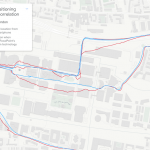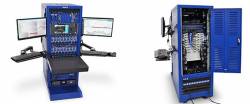China will build a testing and certification network for its BeiDou satellite navigation system over the next three years as part of an effort to make the GNSS system more competitive globally.
China will build a testing and certification network for its BeiDou satellite navigation system over the next three years as part of an effort to make the GNSS system more competitive globally.
According to China’s national news agency Xinhua, the plans were revealed in an August 3 statement from the Certification and Accreditation Administration (CNCA), following the signing of a “strategic cooperation agreement” by the People’s Liberation Army (PLA) General Staff’s Survey and Mapping Navigation Bureau and the CNCA. CNCA Director Sun Dawei and Qi Jianguo, PLA Chief of General Staff assistant, attended the ceremony.
Overseen by a ministerial-level department, the General Administration of Quality Supervision, Inspection & Quarantine of the People’s Republic of China (AQSIQ), the CNCA was authorized by the State Council of China and established in 2001 as part of the overall standardization initiative under the Standardization Administration of the People’s Republic of China (SAC) . Finalization of the CNCA BeiDou plan followed a month-long comment period earlier this year.
According to the CNCA’s statement, the agency will establish an authoritative testing and certification system with uniform standards and legal support to secure the BeiDou system’s “safe operation and accelerate its industrialization.” Based on Chinese civil-military cooperation, the standardization and certification initiative is seen as a way to encourage the acceptance of Compass-branded technology and equipment by manufacturers and users internationally.
By 2015, a national testing center will be set up in Beijing, while another seven local sub-centers will be established across the nation, according to the CNCA. The centers will test the safety and accuracy of products designed for use with the system and qualify them for civilian use.
Among the CNCA’s subsidiary organizations are the National Accreditation Board for Laboratories (CNAL), the China Quality Certification Center, and the China Certification & Inspection Group. The CNAL interfaces with the International Laboratory Accreditation Cooperation (ILAC), which seeks to increase the use and acceptance of the results from accredited laboratories by industry as well as government, thereby promoting “free trade” in the tested products.
The SAC carries out unified management, supervision, and overall coordination of standardization work within China. The SAC represents China within the International Organization for Standardization (ISO) and the International Electrotechnical Commission (IEC), as well as other international and regional standardization organizations.






